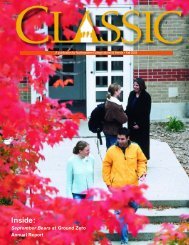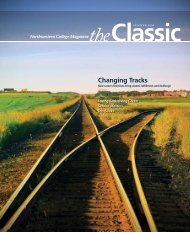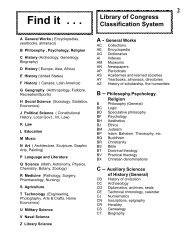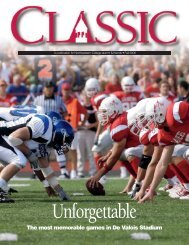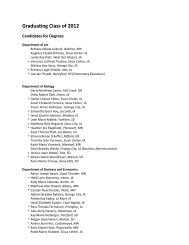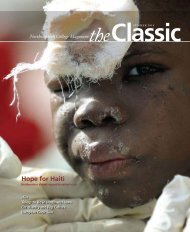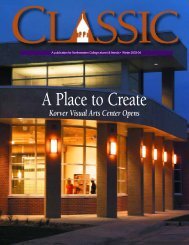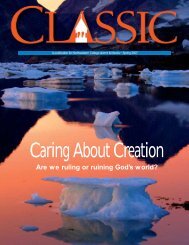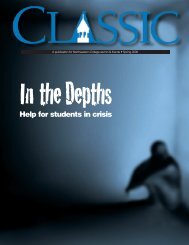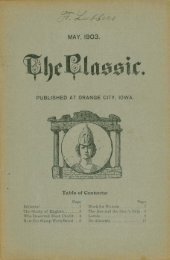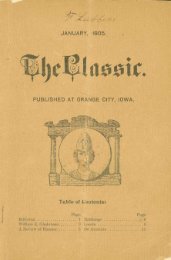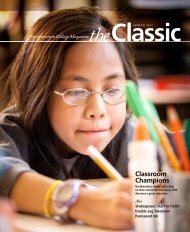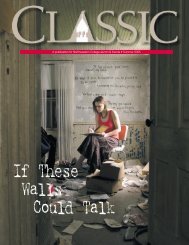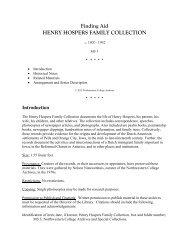fall 2008 - Northwestern College
fall 2008 - Northwestern College
fall 2008 - Northwestern College
You also want an ePaper? Increase the reach of your titles
YUMPU automatically turns print PDFs into web optimized ePapers that Google loves.
The separation of church and state: Certainly.<br />
The separation of religion and politics: Impossible.<br />
Religion and politics are intertwined in such a way that no strict<br />
separation of church and state can ever disentangle the two.<br />
According to our Constitution, there cannot be religious tests for<br />
holding public office. Churches are not to be financially supported by the<br />
state, and the state can’t dictate membership in a religious denomination<br />
or congregation. These constitutional laws can be strictly enforced.<br />
But no strict enforcement of a separation of church and state can<br />
prevent people from entering a voting booth and pulling the lever<br />
according to their religious beliefs, identity or affiliations.<br />
Belief in America<br />
Americans have long been recognized as being highly religious.<br />
When the religious beliefs and practices of Americans are compared<br />
the U.S. is a multifaceted and complicated phenomenon. And as people’s<br />
patterns of religious beliefs, belonging and behavior change, so does the<br />
way in which religion and politics are linked in our country.<br />
Historically, the main way in which religion affected politics has<br />
been through religious affiliation. During the American Revolution,<br />
Baptists and Presbyterians were mostly strong supporters of<br />
independence, while Anglicans (Church of England) were more likely<br />
opposed. As immigrants came to American shores, they also sorted<br />
themselves out politically: German immigrants who were Roman<br />
Catholics tended to align with the Democratic Party, while Germans<br />
who were Lutherans aligned with the Republican Party.<br />
Following the Great Depression, religious groups still tended to align<br />
differently. Most Northern “mainline” Protestants were Republicans,<br />
while most Southern evangelical Protestants, Catholics and Jews were<br />
Democrats.<br />
Voting Booth<br />
with people from countries industrially and culturally similar to ours, the<br />
distinctive quality of American religious life is particularly evident.<br />
This religious character of the American people has important<br />
consequences politically. For many Americans, religion is the foundation<br />
of our basic beliefs and values—even our identity. Religion shapes our<br />
pattern of social interaction, influencing our decisions about those with<br />
whom we talk politics. It also affects where and how we get information<br />
for making political decisions—including voting.<br />
Americans’ religious character also shapes our expectations about<br />
the kind of presidential candidate we think is worthy of consideration.<br />
Surveys reveal Americans want our president to be religious and, by<br />
extension, our presidential candidates to be people of faith.<br />
The specific nature of that religious faith is less important than<br />
the need to have some kind of faith. National surveys have consistently<br />
revealed—both before and after 9/11—that Americans are more willing<br />
to vote for a Muslim than an atheist. Similarly, most Americans welcome<br />
presidential candidates who talk about their faith and share the ways<br />
in which their religious views may guide their political thinking and<br />
policymaking.<br />
Since the founding of the United States, religion has played an<br />
important role in American political and electoral life. But religion in<br />
An “ethnoreligious” link between religion and politics basically<br />
prevailed from the early years of the republic through at least the early<br />
1980s. The different lifestyles and worldviews of people of different<br />
faiths determined what political party—and governmental policies—they<br />
preferred. And with highly religious groups on both sides of the partisan<br />
divide, of course, highly religious individuals could be found on both<br />
sides too.<br />
The God Gap<br />
Increasingly, Americans are seeing a new interplay of religion and<br />
politics. Now, it appears, people’s religious beliefs, rather than their<br />
religious group affiliations, are largely shaping the way in which religion<br />
influences political thought and action.<br />
Instead of our membership in a particular group determining our<br />
political loyalties, they are more determined by individuals’ religious<br />
perspective as it relates to “traditionalist/modernist” positions and the<br />
conflicting worldviews that underlie them.<br />
Religious beliefs and behaviors align religious traditionalists on<br />
one side of the partisan divide and secularists and modernists on the<br />
other. The result is a “God gap” in American politics, and one’s religious<br />
affiliation is much less relevant.<br />
<strong>Northwestern</strong> Classic 17



